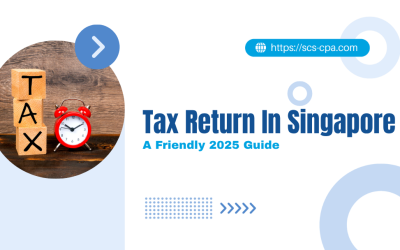For a Private Limited Company (Pte Ltd) in Singapore, there are specific annual compliance requirements that must be met. Doing so helps remain in good standing with the Accounting and Corporate Regulatory Authority (ACRA) and the Inland Revenue Authority of Singapore (IRAS). Here’s a detailed breakdown, including timelines, for the annual filing requirements:
1. Filing of Annual Returns
Purpose: To provide essential updates about the company’s structure and financial health to ACRA.
Timeline: Within 7 months from the financial year-end.
Requirements:
- A declaration of the company’s solvency.
- Details of company officers, registered address, and shareholders.
- Financial statements in XBRL format (if applicable).
2. Filing of Financial Statements
Purpose: To ensure that the financial records presented at the AGM are officially recorded.
Timeline: Filed together with the annual return, within 7 months from the financial year-end.
Complete set of unaudited or audited financial statements, including:
- Balance Sheet
- Profit and Loss Statement
- Cash Flow Statement
- Director’s Statement
- Auditor’s Report (if required)
3. Corporate Income Tax Return Filing (Form C-S/C)
Purpose: To declare the company’s income to IRAS and determine tax liability.
Timeline:
- E-Filing: By November 30.
- Paper Filing: By October 31.
Requirements:
- Form C-S if the company claims to have straightforward tax matters.
- Form C if the company has more complex accounting, possibly needing complete financial statements and tax computations.
More Reads: Tax Return In Singapore: A Friendly 2025 Guide
4. Annual General Meeting (AGM)
Purpose: Shareholders are presented with the company’s accounts, which serve as an annual compliance measure to ensure transparency.
Timeline: Must be held within 6 months of the financial year-end for listed companies, and within 15 months of the last AGM for other companies.
5. Estimated Chargeable Income (ECI)
Purpose: An estimate of the company’s taxable income for the year, submitted early to IRAS.
Timeline: Within 3 months after the end of the financial year.
Complete set of unaudited or audited financial statements, including:
- Companies must file ECI if the annual revenue exceeds S$1 million or if ECI is not zero.
- Companies with annual revenue of S$5 million or below and ECI is NIL for the Year of Assessment (YA), do not need to file ECI.
Annual Compliance Checklist:
- January to March: Prepare and file ECI if required.
- April to June: Prepare for the AGM; finalise annual accounts.
- July to September: Hold AGM; file Annual Returns.
- By October/November: Submit Corporate Income Tax Return (Form C-S/C).
Considerations:
- Record Keeping: Companies are required to keep financial records and supporting documents for 5 years from the relevant YA.
- Audit Requirements: Certain companies might need audited accounts unless they meet the minor company exemption criteria.
Meeting these timelines is crucial for compliance and avoiding penalties. It’s often beneficial for SMEs to work with a corporate secretary or a professional advisory firm. This action ensures all annual compliance requirements are met accurately and on time.
Disclaimer: The information provided in this article is intended for general guidance only and reflects regulations as of the publication date. Given that compliance requirements, processes, and fees may change over time, readers are advised to consult official sources such as ACRA for the most up-to-date information or seek professional guidance from our team.
2026 Guide to SME Compliance in Singapore
Explore our comprehensive guide on SME compliance in Singapore, designed to help business owners navigate the intricacies of regulatory requirements efficiently. Stay informed and ensure your SME adheres to all legal standards with our expert advice and actionable steps
Corporate Income Tax Malaysia: Rates, Filing, and Strategic Compliance
Understand Malaysia’s corporate income tax system. Learn current tax rates, SME tiers, filing deadlines, LHDN requirements, penalties, and more.
Understanding the Core Types of Audits and Their Roles in Accounting in Singapore
Learn the key types of audits in Singapore to build trust and stay compliant. Examples are statutory, internal, GST, and forensic.
Tax Return In Singapore: A Friendly 2025 Guide
Want to be a responsible business owner? Read this guide to tax return in Singapore to help understand tax filing and play your part.






